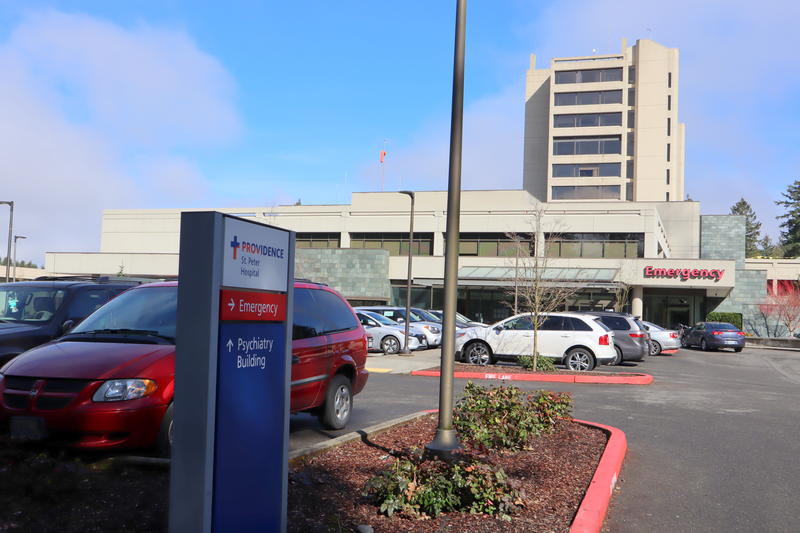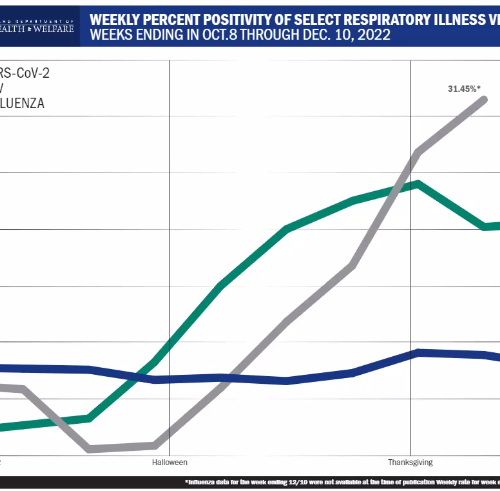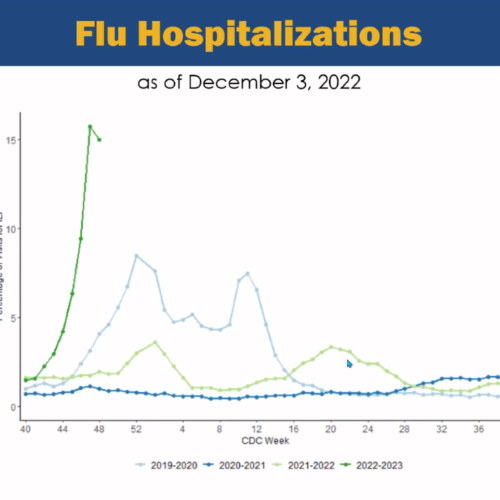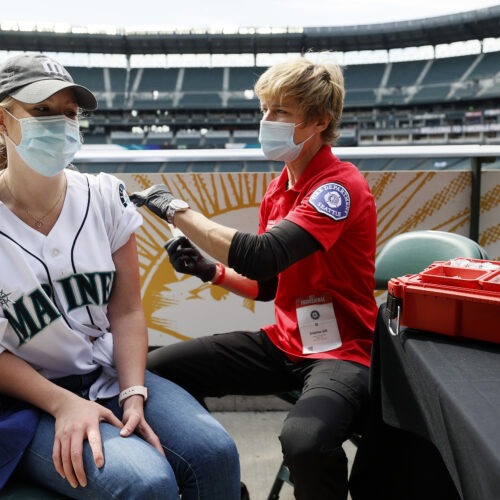
As Washington COVID Cases Surge, A Chief Medical Officer Prepares Hospitals For The Worst
READ ON
QUICK LINKS:
–Extended Washington Closure Order Through Jan. 4
–Washington Coronavirus Website
–Washington COVID-19 Cases And Data Dashboard
At Providence St. Peter Hospital in Olympia, nurses with desk jobs are being told to prepare to come back to the front lines, and elective surgeries and procedures are once again being put on hold.
The desperate measures come amidst an ongoing spike in coronavirus cases in the community and as the hospital prepares for a post-Thanksgiving surge of COVID-19 patients.
“Unfortunately, I think within the next week it’s going to be a significant rise in COVID-19,” said Dr. Kevin Caserta, the chief medical officer for Providence SW Washington.
Already, the two hospitals Caserta oversees, St. Peter and Providence Centralia, have seen a near doubling of COVID patients over the past six to eight weeks – from roughly 25 to nearly 50 today.
“We’re continuing to see significantly increased volumes of COVID-19 throughout all of southwest Washington,” Caserta said.
That was reinforced Wednesday in an open letter to the community from Thurston County Health Officer Dimyana Abdelmalek who said high rates of community transmission of COVID continue.
“The COVID-19 situation in Thurston County is dynamic and changing quickly,” Abdelmalek said.
Statewide, 77 percent of intensive care unit beds are occupied and 25 percent of those patients have or are suspected to have COVID, according to the state’s risk assessment dashboard. Overall, COVID patients account for more than 1,100 of the state’s current hospital patients, or about 12 percent.
At Providence St. Peter, where the critical care unit is filling up, Caserta estimated about a quarter to a third of the patients are there because of complications from the virus.
Hospital staffing shortages are adding to the challenges. Caserta said his front-line caregivers are working overtime shifts with no indication the demand will let up. In order to prepare for a crisis scenario, starting this week nurses in Providence Southwest Washington’s quality control and clinical documentation departments are receiving recertification training in case they are needed to help with direct patient care.
“Obviously, we’re hoping not to have to utilize resources such as that, but we are planning ahead so that way we can definitely meet the community’s needs no matter what the volumes,” Caserta said.
In addition, for the first time since this past spring, Caserta said his hospitals are once again canceling non-urgent surgeries and procedures that would require the patient to be admitted to the hospital.
It’s a precaution hospitals across the state are taking to ensure they have surge capacity, said Cassie Sauer, CEO of the Washington State Hospital Association.
“We’re hearing from patients around the state … who have joint replacements or brain surgery or even removal of slow growing cancers that have been canceled,” Sauer said.
Another issue hospitals are dealing with, Sauer said, is hundreds of patients who are ready to be discharged, but have nowhere to go. Her organization is working with the state to find options in the community.
“We are really pushing on the Department of Social and Health Services and the Health Care Authority … to help us get them out,” Sauer said.
Whether hospitals get walloped or get a breather in the weeks ahead, Providence’s Caserta said the holiday season will not be one of rest and relaxation for healthcare workers. Instead, the current surge in COVID cases will mean more overtime shifts and more fatigue as the pandemic approaches the one year mark.
“There will be no significant breaks for anybody during this holiday season,” Caserta said.
The months-long pandemic is taking a toll on healthcare workers. Caserta described the “moral distress” experienced by nurses who are often the only ones with COVID patients as they die. He said when he talks to caregivers they are often distressed, frustrated and angry they’re not getting more support from the public.
His message to the public this holiday season: mask up, wash hands and avoid gatherings.
“You’ll be able to keep your loved ones safe, keep yourself safe and quite frankly give an awesome Christmas gift to our caregivers if you do the things we know that help to prevent the spread of the virus,” Caserta said.
If the public doesn’t heed this advice, Caserta said, the healthcare system could easily face yet another surge in patients after the holidays.
Related Stories:

Some hospitals in contingency operations, pediatric units rationing drugs
Idaho’s hospitals are feeling the strain from the “tripledemic” of RSV, flu and COVID-19, officials say. Dr. Jim Souza is the chief physician executive at St. Luke’s Health System in Boise.

Health department: ‘Now is the time to get vaccinated’
Officials say children have lowest vaccination rate, urge regular masking in crowded, confined spaces

4th Wave Of COVID Hospitalizations Hits Washington, With Rural Areas A Focus For Vaccines
Similar to the national trends, the patients being hospitalized in Washington are now overwhelmingly young and middle-aged adults — not older Americans who are mostly vaccinated at this point.















